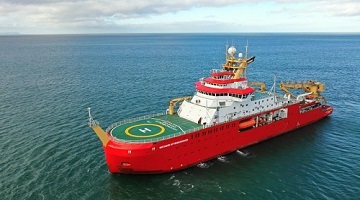About this course
MSc Maritime Energy Efficiency with specialist modules covering Energy Efficiency, Marine Environmental Protection and Maritime Cyber Security
The technological and regulatory developments in the maritime industry, particularly those related to ship's energy efficiency and emission control, have caused a void that LJMU has recognised can only be filled through a formal educational programme. Discussions at IMO could potentially lead to a new ‘energy efficiency officer’ role onboard ship, in order to help achieve the IMO’s target of 40% reduction CO2 emissions by 2030 and 70% by 2050. These shore or shipboard personnel will also need a thorough awareness of issues related to Cyber Security and environment protection. The new programme will incorporate modules on Energy Efficiency, and Cyber Security Marine Environment Protection. This programme will therefore suit all personnel who need to enhance their knowledge and abilities in these areas.
The course will combine our expertise in engineering, renewable and maritime teaching and research, to provide a holistic solution for shipping, ports and shipyards.
The foundation of this one year MSc Maritime Energy Efficiency programme is built around three subject specialist modules; 'Conventional Fuels and Alternative Energy Sources’, ‘Marine Environmental Protection’ and ‘Energy Efficiency (Ships and Ports)’. The unique content of this programme covers topics not often seen in higher education, for personnel considering coming ashore from a seafaring career, or for those progressing into management level roles in shore based ship management.
The MSc Maritime Energy Efficiency programme design takes into consideration the current technological and regulatory developments in the industry and at IMO, their integration into industrial operations and appreciation of their limitations – all factors that will provide the students completing this course with a distinct standing in the industry and career progression to senior management roles, allowing them to manage and/or operate their ships efficiently.
Course modules
Discover the building blocks of your programme
Further guidance on modules
Modules are designated core or optional in accordance with professional body requirements, as applicable, and LJMU’s Academic Framework Regulations. Whilst you are required to study core modules, optional modules provide you with an element of choice. Their availability may vary and will be subject to meeting minimum student numbers.
Where changes to modules are necessary these will be communicated as appropriate.
Core modules
Project Management
10 credits
10 credits
The central theme of this module is the management of projects using known standards and methodologies. It aims to develop a sound understanding of the fundamental concepts of managing projects. You are given the opportunity to develop your skills in a practical and theoretical context.
Maritime and Offshore Safety Analysis
20 credits
20 credits
This module aims to enable you to understand and implement the requirements of formal safety design, assessment and review in marine, offshore and port areas.
Research Skills
10 credits
10 credits
The module will help prepare you to undertake your own research project and deliver the required skill set for successful completion of your investigations.
Conventional Fuels and Alternative Energy Sources
20 credits
20 credits
This module recognises that the ways in which the maritime industry fuels vessels and the wider maritime sector is changing. In the light of rapidly shifting regulation and stringent goals for decarbonisation, the module will consider what the prospects are for new alternative fuels and how the maritime industry will adapt.
Marine Environmental Protection
10 credits
10 credits
This module aims to provide the students with an opportunity to evaluate the impact of ship and port operations on climate change and global warming and propose measures to promote safe, secure, environmentally sound, efficient and sustainable shipping.
Maritime Cybersecurity
10 credits
10 credits
This module aims to provide operational knowledge of the IT and other systems so that their vulnerabilities can be identified, and cyber-attack risks mitigated.
Energy Efficiency (Ships and Ports)
20 credits
20 credits
This semester long module aims to provide the student with an opportunity to propose energy efficiency measures and systems that could be implemented at sea and/or in ports, based on an appraisal of current practices.
MSc Dissertation
60 credits
60 credits
This project module provides you the opportunity to demonstrate your ability to drive your own deep/thorough investigation, undertake high quality academic research and demonstrate critical evaluation of your results.
Optional Modules
Maritime Economics and Management
20 credits
20 credits
The module is designed to provide a comprehensive overview of the topics including chartering, finance, economics, management, and operational considerations, which a shipping executive could deal with on a routine basis.
Marine Technology Management
20 credits
20 credits
Your Learning Experience
An insight into teaching on your course
Study hours
Teaching takes place throughout the week. Exact timetabled hours depend on the option modules selected.
Teaching methods
On this course you will be taught by academics active in industrially-oriented research and scholarship, via lectures and directed student-centred learning, such as case studies.
Applied learning
Industrial visits are an important part of the course enabling you to understand developments in the market.
How learning is monitored on your programme
To cater for the wide-ranging content of our courses and the varied learning preferences of our students, we offer a range of assessment methods on each programme.
Where you will study
What you can expect from your School
The School’s resources include a number of laboratories, full mission bridge and engine room simulators, computer facilities together with dedicated suite of specialised software, and wave flume – for modelling and simulation of scaled up offshore energy devices to support this programme. The School places a large emphasis on the practical approach to the teaching of engineering and technology, and therefore investment in the development of specialist laboratory and computer facilities is high on the agenda.
Course tutors
Our staff are committed to the highest standards of teaching and learning

Philip Davies
Programme Leader
I enjoy what I do! This means continuous improvement in my own performance through internal training or liaison with external providers as well as regulatory bodies to deliver comprehensively tailored, externally approved or bespoke learning packages.
I enjoy what I do! This means continuous improvement in my own performance through internal training or liaison with external providers as well as regulatory bodies to deliver comprehensively tailored, externally approved or bespoke learning packages.
Abdul Khalique is Master Mariner and author of several publications including a number of books. He is experienced both at sea and ashore. As a motivational team leader who believes strongly in leading by example, his success is based on developing team skills, empowering everyone to develop their potential and therefore helping them utilise their ideas through support and encouragement, whilst ensuring accountability. Authoring books is his, and he takes immense satisfaction in sharing his vast knowledge and experience with the rest of the world, particularly with learners who need it the most.
-
 Reader
Reader -
 Lecturer/Senior Lecturer
Lecturer/Senior Lecturer
Career paths
Further your career prospects
LJMU has an excellent employability record with 96% (HESA 2018) of our postgraduates in work or further study six months after graduation. Our applied learning techniques and strong industry connections ensure our students are fully prepared for the workplace on graduation and understand how to apply their knowledge in a real world context.
Upon completion of this programme, the graduates will be suitable for the following typical roles:
- Energy Efficiency Engineer/Officer (maritime/shipping sector) – placed onboard cruise ships but may as well be placed ashore. At times this role is advertised as ‘Environmental Officer’ or ‘Compliance and Energy Officer’.
- Protection & Indemnity (P&I) Club – Insurance Risk Manager, particularly for those with ship brokerage, seafaring or insurance background
- Marine/Technical Superintendent, Designated Person Ashore (DPA) – Those with seafaring background will be more attracted to these positions if they hold an LJMU MEE degree.
- Fleet Energy Performance Manager - The position holder is responsible for reducing energy consumption across the given assets and provide necessary regulatory reports.
- Project Engineer – for new builds, conversion of existing vessels to install new technology.
- Maritime & Coastguard Agency (MCA)/Classification Society Examiner/Surveyor
- Progress on to a PhD to pursue an academic career
Fees and funding
Tuition Fees:
- Home fee:
- £10,415
There are many ways to fund postgraduate study for home and international students
Fees
The fees quoted at the top of this page cover registration, tuition, supervision, assessment and examinations as well as:
- library membership with access to printed, multimedia and digital resources
- access to programme-appropriate software
- library and student IT support
- free on-campus wifi via eduroam
Additional costs
Although not all of the following are compulsory/relevant, you should keep in mind the costs of:
- accommodation and living expenditure
- books (should you wish to have your own copies)
- printing, photocopying and stationery
- PC/laptop (should you prefer to purchase your own for independent study and online learning activities)
- mobile phone/tablet (to access online services)
- field trips (travel and activity costs)
- placements (travel expenses and living costs)
- student visas (international students only)
- study abroad opportunities (travel costs, accommodation, visas and immunisations)
- academic conferences (travel costs)
- professional-body membership
- graduation (gown hire etc)
Funding
There are many ways to fund postgraduate study for home and international students. From loans to International Scholarships and subject-specific funding, you’ll find all of the information you need on our specialist postgraduate funding pages.
Please be aware that the UK’s departure from the EU may affect your tuition fees. Learn more about your fee status and which tuition fees are relevant to you.
- International fee:
- £18,250
International Scholarships and payment plans
Liverpool John Moores University is committed to supporting international students by providing a range of scholarships and flexible payment plans to help students manage their tuition fees.
Scholarships
LJMU provides a variety of scholarships to support international students. Scholarships are available to self-funded students who have accepted their offer and met all the conditions outlined in their offer letter. Students must also demonstrate that they can cover living costs, travel, and other expenses associated to studying at the university. Postgraduate scholarships include tuition fee reductions and are often offered in partnership with external funding organisations.
All self-funded international students are eligible for an automatic scholarship worth up to £4,000. For more details and to view our full list of scholarships, visit the international scholarship webpages.
Deposit
All students must pay a £5,000 deposit before they can receive their CAS letter.
For more information view our deposit page.
Tuition Fee Payment Plan
After paying their £5,000 deposit, students have the option to pay their fees in full or in three equal instalments minus any internal scholarships and discounts. There are two payment options available for international students. You can either pay your tuition fees in full before enrolment or opt for a payment plan. With the payment plan, you can pay your fees in three instalments after making your £5,000 deposit. The first instalment is due before enrolment.
All payments should be made through Flywire. Full details can be found in the How to Pay Guide.
Early Bird Tuition Fee discount
We are excited to introduce a £500 Early Payment Discount to all self-funded international students. Eligible self-funded students who pay their fees by the required deadlines will get a discount which will be automatically deducted from the 1st year of tuition fees.
To see the required deadlines please visit the webpage
Entry requirements
You will need:
Qualification requirements
Undergraduate degree
The normal requirements for entry to the award Programme are as follows:
- An honours degree or equivalent in Maritime, Naval Architecture, Transport, Logistics, Business, Management or related studies.
- Applicants with an unclassified degree and significant relevant industrial experience as ship operators, superintendents, port and shipyard managers and other maritime professionals may be considered.
- Evidence of experiential learning in the maritime industry, such as a Master Mariner or Chief Engineer Certificate of Competence.
Alternative qualifications considered
- Other qualifications considered by the course team to be of similar academic level to the above.
- Other qualifications or experience deemed to be equivalent to the above. In particular, mature students must provide evidence of adequate educational and/or industrial experience to assure a reasonable chance of success on the award programme.
- All applicants must provide evidence of competence in English. The level of English language required should be equivalent to 6.5 for IELTS with at least 5.5 in individual components, within the previous 24 months.
- Applicants who have studied and successfully achieved a UK Degree within the previous 24 months are exempt from the requirements to produce evidence of competence in English.
- The Department actively supports the University Equal Opportunities policy and strategy in its underlying philosophy to value and respect individuals, and its commitment to maximize the potential of each student. The Department is committed to complying with all relevant legislation. Applications from students with disabilities are positively welcomed.
- Applications are considered on the basis of academic criteria alone. Students are invited to contact the Equal Opportunities Unit for an information pack detailing the facilities, support available and physical access to the main University buildings. Students may also visit the University to discuss support strategies with the University Disability Welfare Advisor.
International requirements
Other international requirements
Please note that this programme requires offer holders to apply for ATAS. For more information please visit https://www.ljmu.ac.uk/international/holding-offer-of-study/atas-guidance
How to apply
Securing your place at LJMU
To apply for this programme, you are required to complete an LJMU online application form. You will need to provide details of previous qualifications and a personal statement outlining why you wish to study this programme.
Your student experience
There's so much more to university than just studying for a degree.
Talk to our students
Connect with a current LJMU student through Unibuddy for insights and advice on university life, courses, and more.
See what our students are saying
At LJMU we want you to know you’re making the right choice by studying with us. You can see what our students are saying about their experience with us through their reviews on the following websites:
Related Links
News and views
Browse through the latest stories and updates from the University and beyond










The University reserves the right to withdraw or make alterations to a course and facilities if necessary; this may be because such changes are deemed to be beneficial to students, are minor in nature and unlikely to impact negatively upon students or become necessary due to circumstances beyond the control of the University. Where this does happen, the University operates a policy of consultation, advice and support to all enrolled students affected by the proposed change to their course or module.








